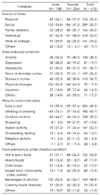Abstract
This study was done to investigate the effect of stress on appetite and eating habits, and other health-related behaviors. The subjects of this study consisted of 188 males and 224 females in Ulsan area. The results were as follows: When stressed, 56% (n = 231) of the subjects experienced a change in appetite and of these, 32% (n = 132) experienced an increased appetite. Stress-induced eating may be one factor contributing to the development of obesity. There was a gender-specific response to stress in which women are more likely to use food to deal with stress, whereas men are more likely to use alcohol consumption or smoking. It was found that types of stressors were individual (52.9%), social (50.7%), family relations (34.5%), work demands (34.2%) and physical environment (32.3%). Stress-induced symptoms of the subjects were anxiety (38.3%), headache (36.7%) and neck or shoulder aches (36.2%), and females experienced those symptoms more than males. Those older than 50 years had a higher eating habit score and lower stress score compared with younger subjects. There were significant differences between sex, age, occupation, family type, BMI, exercise, sleeping hours and eating habits or stress level. This study may be helpful in advancing findings in this area to better provide health professionals with appropriate counseling tools to improve the health of all individuals.
Figures and Tables
References
1. Lee JB. Serum lipid and antioxidant status in person with stress. J Korean Acad Fam Med. 2000. 21:514–521.
2. Lee YS. The relation ship between stress and health habits in industrial workers. Korean J Prev Med. 1990. 23:205–214.
3. Park EY, Park HC, Park KS, Sohn SJ. Relationship between stress and health behaviors practice. J Korean Acad Fam Med. 2000. 21:1436–1450.
4. Park JS, Oh JJ, Kim OS. the relationship between health habits and stress amount in life events. J Korean Acad Fam Med. 1998. 19:205–215.
5. Torres SJ, Nowson CA. Relationship between stress, eating behavior, and obesity. J Nutr. 2007. 23:887–894.

6. Jayanthi K, Melissa Y, James J, Michaela M. Stress influences appetite and comfort food preferences in college women. Nutr Res. 2006. 26:118–123.

7. Ng DM, Jeffery RW. Relationships between perceived stress and health behaviors in a sample of working adults. Health Psychol. 2003. 22:638–642.

8. Hwang JY, Ru SY, Ryu HK, Park HJ, Kim WY. Socioeconomic factors relating to obesity and inadequate nutrient intake in women in low income families residing in Seoul. Korean J Nutr. 2009. 42(2):171–182.

9. Kouvonen A, Kivimaki M, Cox SJ, Cox T. Relationship between work stress and body mass index among female and male employees. Psychosom Med. 2005. 67:577–583.

10. Kim KH. A survey on the relation between stress and nutrient intake in adults. Koean J Food Culture. 1999. 14:507–515.
11. Han MJ, Cho HA. Dietary habit and perceived stress of college students in Seoul area. Korean J Food Culture. 1998. 13(4):317–326.
12. Steptoe A, wardle J, Pollard TM, Canaan L, Davies GJ. Stress, Social support and Health-related behavior: a study of smoking, alcohol consumption and physical exercise. J Psychosom Res. 1996. 41:171–180.

13. Kim HK, Kim JH, Park YS. A study on dietary behavior and health condition of employee at department stores. Korean J Community Nutr. 2008. 13(3):374–385.
14. You SY, Kim HK. Food habits and health food consumption patterns of adults in Ulsan area. Korean J Community Nutr. 2003. 889–900.
15. Jo JI, Kin HK. Food habits and eating snack behaviors of middle school students in Ulsan area. Korean J Nutr. 2008. 41(8):797–808.
16. Ministry of Health and Welfare. Report on 2005 National Health and Nutrition Survey. 2007.
17. Shim HY. A study on health life habit of 30-40 years' men workers. 2000. Seoul: Chung-Ang University;[Master degree thesis].
18. Yoon SH, Bae JY, Lee SW, An KE, Kim SE. The effects of job stress on depression, drinking and smoking among korean men. Korean Assoc Health Medical Sociol. 2006. 19:31–50.
19. Sung MH, Yoon JW, Son HY. A study of the relationship between stressful life events and mental health in middle-aged women. J Korean Acad Psych Mental Health Nurs. 2005. 14(2):186–194.
20. Song SW. A study on the relation between self-esteem and level of the stress perceived, coping style of stress of the college students. Korean J Student Guidance. 1999. 12:167–198.
21. Cho JY, Song JC. Dietary behavior, health status, and perceived stress of university students. Korean J Food & Nutr. 2007. 20(4):476–486.
22. Crithlow B. The power of John barleycorm: Beliefs about the effects of a alcohol on social behavior. Am Psychologist. 1986. 41:751–764.
23. Park SH. Analysis of dietary habits and health-related behavior according to stress level and age of women. 2006. Changwon: Changwon University;[Master degree thesis].
24. Kim KH. The relation between stress and nutrient intake status in female university students. Korean J Food Culture. 2000. 15:387–397.
25. Michaud CI, Kahn JP, Musse N, Burlet C, Nicolas JP, Mejean J. Relationships between a critical life event and eating behavior in high school students. Stress Med. 1990. 6:57–64.

26. Pollard TM, Steptoe A, Canaan L, Davies GJ, Wardle J. The effects of academic examination stress on eating behaviors and blood lipid levels. Int J Behav Med. 1995. 2:299–320.

27. Oliver G, Wardle J. Percieved effects of stress on food choice. Physiol Behav. 1999. 66:511–515.




 PDF
PDF ePub
ePub Citation
Citation Print
Print












 XML Download
XML Download